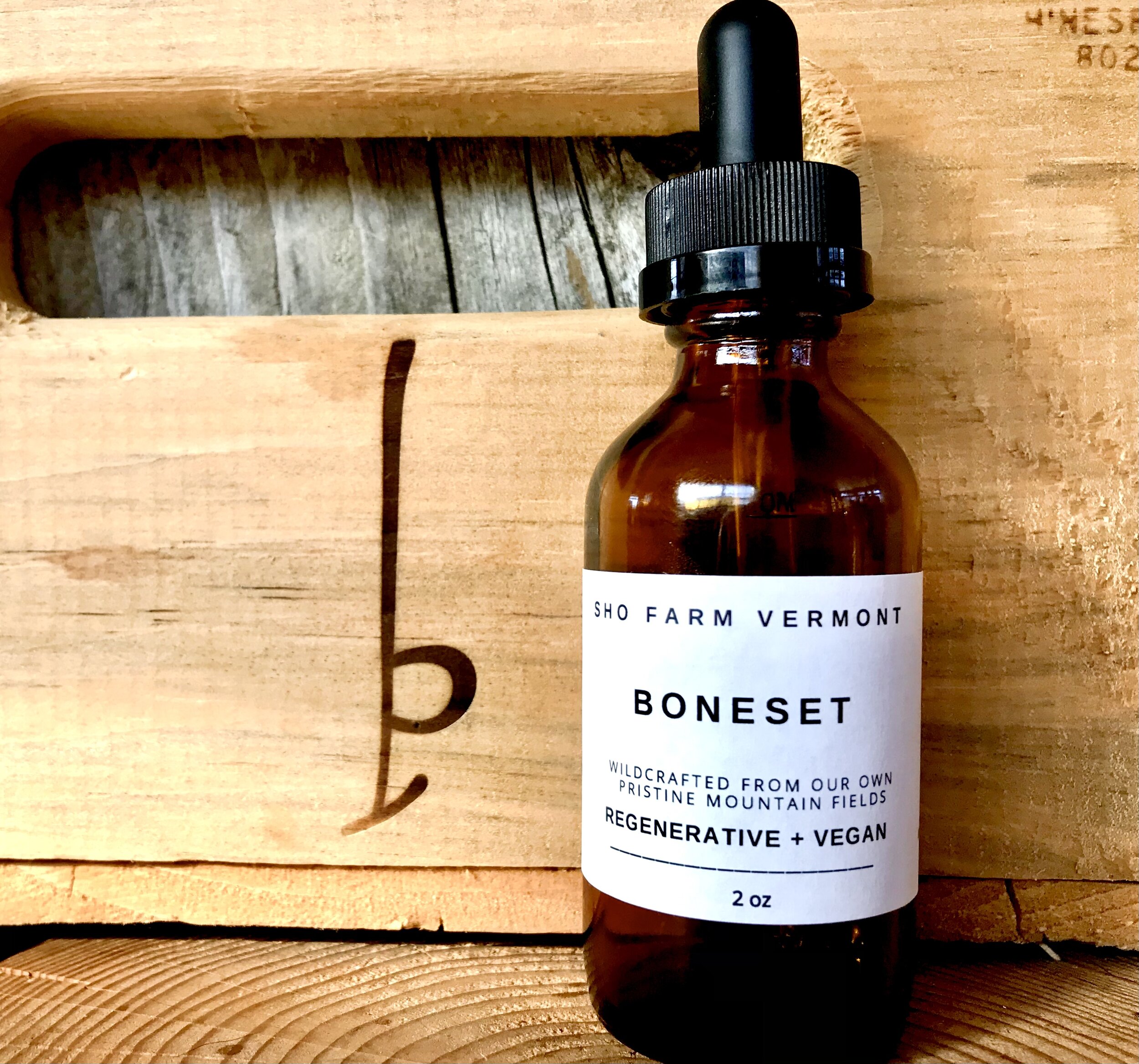Boneset Tincture: Lungs, Fever, & Bone Pain Due to Fever, Lyme, Immunostimulant


Boneset Tincture: Lungs, Fever, & Bone Pain Due to Fever, Lyme, Immunostimulant
*Eligible for Helping Hand Program
Boneset, Eupatorium perfoliatum, has historically been used for the treatment of fever—especially the fever felt deep in the bones, or for recurring fever. This tincture is made with full-strength 190 proof ethanol and is meant to be taken in hot water as needed.
Herbalist Stephen Buhner recommends boneset’s function in the treatment of Covid-19 as protective of organs in the inflammatory process: “the increase of TNF-a and IL-1â in the system stimulates the “shedding” of ACE2 which results in less membrane-bound ACE2 on the body’s cells. This is pervasive throughout the body – the more inflammation, the more shedding. No matter the organ, when this shedding occurs, organ function decreases. (Plants that can inhibit TNF-a include Andrographis paniculata, Cordyceps spp, Eupatorium perfoliatum [boneset], Glycyrrhiza spp, Houtuyynia cordata, Pueraria lobata, Sambucus spp, Scutellaria baicalensis, Salvia miltiorrhiza, and melatonin, not a plant but useful in this infection for a variety of reasons. IL-1â inhibitors include Cordyceps spp, Eupatorium perfoliatum [boneset], Polygonum cuspidatum, Pueraria lobata, Salvia miltiorrhiza, Scutellaria baicalensis.)
It is incredibly bitter, so be prepared to take it as a very effective medicine. Too much boneset can cause nausea, so back off your dosage if you feel nauseous. You don’t need much of this potent herb.
Susun Weed writes and speaks about boneset as a once-widely used herb in cooking, in place of garlic. The palate of our past was much more tuned to bitter flavors, which benefit digestion and the liver.
She also states that boneset is ideal for recurring Lyme disease.
Medical herbalist Richard Whelan writes of boneset:
In every epidemic of influenza it has been used with great advantage. During the severe pandemic of 1918-19 it was one of the safest and most successful remedies employed and contributed much to the successful management of the disease under Eclectic treatment.
By many it came to be used as a prophylactic, persons taking it freely apparently escaping attack. Notwithstanding this, its prophylactic power, if it has any, is as yet unexplained and should not be seriously relied upon.
That cases were rendered milder, deep-seated pain promptly relieved, cough and respiratory irritation lessened, and recovery expedited under the liberal administration of eupatorium is a matter of record. It is especially valuable to relieve the intolerable backache and pain in the limbs.
Eupatorium often relieves periosteal pain of a neuralgic type, particularly if associated with malarial infection, but it renders no service in that caused by inflammation or by syphilitic or other organic changes in the periosteum [a dense layer of vascular connective tissue enveloping the bones except at the surfaces of the joints].
In respiratory affections boneset is efficient to relieve cough, acting best in that occurring in the aged and debilitated, where there is an abundance of secretion, but lack of power to expel it. It also relieves hoarseness, and sometimes benefits in humid asthma.
It is one of the best of medicines to relieve the irritable cough of measles, but care must be taken not to push its effects to nausea and vomiting. For children it is best administered in an aromatized syrup. In pneumonia it relieves chest pains and cough, and for these purposes may be employed in the early stage of acute lobar, but more effectually in broncho-pneumonia. After the active stages have passed it again becomes useful to allay the irritable after-cough and to assist in expectoration when bronchorrhea occurs. Being tonic and stomachic, when given in small doses it improves the appetite and digestion and thus favors a more rapid and perfect convalescence.
Read Richard Whelan’s monograph on boneset HERE
And more from Stephen Buhner’s book Herbal Antibiotics:
“The sesquiterpene lactones in boneset have a large range of actions. They are highly immunostimulatory and very active against cancers. They also possess antiplasmodial actions. The action is mild, but if the plant is added to a traditional antimalarial that is strong, such as cryptolepis, the effects are mutually supportive. A homeopathic formulation of boneset was found to significantly inhibit plasmodial replication (60 percent inhibition). Clinical trials have shown that boneset stimulates phagocytosis better than echinacea, is analgesic (at least as effective as aspirin), and reduces cold and flu symptoms. In mice it has shown strong immunostimulant activity and cytotoxic action against cancer cells. Despite boneset’s long use and potent reputation, little research has occurred with the plant. In clinical practice, however, it is one of the most potent herbs for enhancing immune function, especially in periodic diseases like bartonellosis. It will reliably counter bacterial or viral immune suppression in diseases that present as periodics.”
Buhner, Stephen Harrod. Herbal Antibiotics, 2nd Edition: Natural Alternatives for Treating Drug-resistant Bacteria (p. 268). Storey Publishing, LLC. Kindle Edition.
